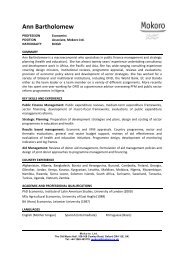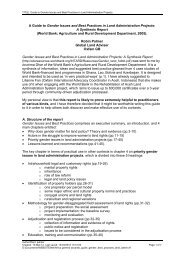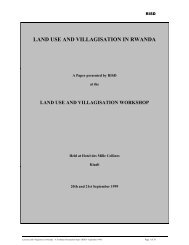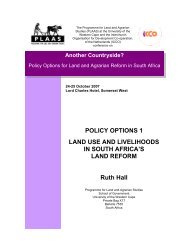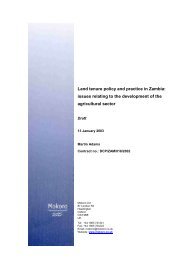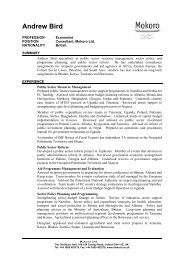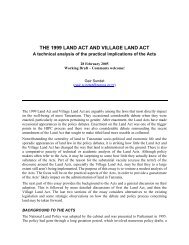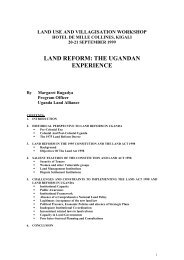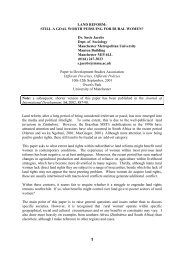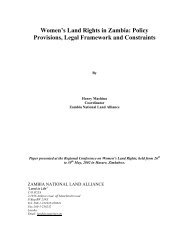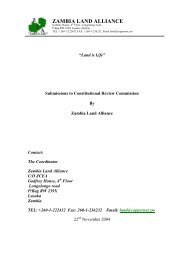Malawi National Land Policy - Mokoro
Malawi National Land Policy - Mokoro
Malawi National Land Policy - Mokoro
You also want an ePaper? Increase the reach of your titles
YUMPU automatically turns print PDFs into web optimized ePapers that Google loves.
Ministry of <strong>Land</strong>s Page 18<br />
provision will be made to rationalize and accord full<br />
statutory recognition to customary land rights.<br />
2.4 Contemporary Development Without <strong>Policy</strong><br />
2.4.1. The government of <strong>Malawi</strong> has operated without a comprehensive land policy since<br />
independence. The 1965 <strong>Land</strong> Act currently in use no longer reflects the practical realities of<br />
<strong>Malawi</strong>’s land management problems and opportunities. Consequently, the land policy<br />
environment in <strong>Malawi</strong> has been characterized by weak planning coordination, absence of<br />
proactive policy interventions and limited capacity for dynamic monitoring at all levels of land<br />
administration.<br />
2.4.2. Some of the main effects of operating without a comprehensive policy on land can be<br />
summarized as follows:<br />
a. Failure to deal with the land policy concerns from the 1960’s and 1970's have<br />
indirectly contributed to today's problems of poverty, food insecurity, and perceived<br />
inequities in access to arable land.<br />
b. In most areas the void created by the absence of clear policy direction heightened<br />
tenure insecurity, environmental degradation and the cultivation of marginal land areas.<br />
Soil loss due to erosion and deforestation is currently estimated to average 20 tons per<br />
hectare per annum.<br />
c. Besides the loss of soil fertility and agricultural productivity, the frequency of land<br />
tenure encroachments has increased in recent years. This trend has also been attributed<br />
to increasing poverty and poor enforcement capabilities of government agencies.<br />
d. Increasing environmental degradation, loss of biodiversity, diminishing surface and<br />
ground water aquifers is a manifestation of land pressure. Since 1972, total forest cover<br />
has declined by more than 41% mainly due to the demand for wood fuel and clearing to<br />
expand cultivation.<br />
e. The legal structure inherited from the colonial era has been used to weaken the<br />
customary sector and to make the estate sector bias feasible rather than reformed. This<br />
heavy bias in favor of the estate production mode appears to contribute to the shortages<br />
of arable land in some regions.<br />
f. Fraudulent disposal of customary land by headpersons, chiefs and government<br />
officials often deny critically needed access to people most desperate for land.<br />
2.4.3. Food security, increased rural incomes and effective utilization of land can only be<br />
assured in <strong>Malawi</strong> by a careful examination of (i) the existing tenure tenets and enabling<br />
customs, (ii) the current land policy and enabling land legislation, and (iii) by implementing the<br />
requirements for encouraging land policy reforms that will stimulate economic growth.<br />
2.4.4. These observations from previous land utilization studies and the recommendations of<br />
the Presidential Commission has reinforced the Government’s desire to accelerate the pace for<br />
drafting a new national land policy for <strong>Malawi</strong>.<br />
3.0 OVERVIEW OF LAND PROBLEMS<br />
http://www.malawi.gov.mw/lands/landpol.htm 29/03/2005 15:23:13



